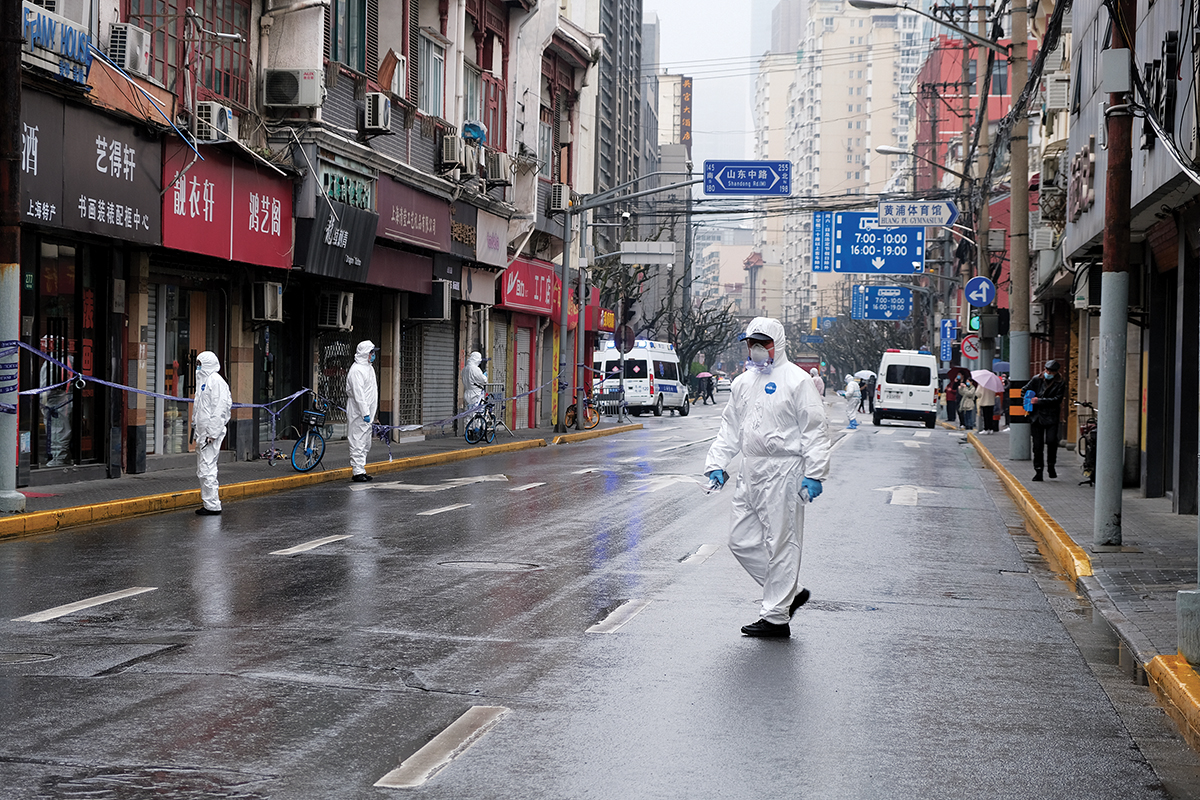Business Far From Usual Under China’s Lockdown
Posted on May 7, 2021
The early and sudden COVID-19 lockdowns in Shanghai, above, and throughout Asia forced managers like Joanna Hutchins ’94 to figure out how to keep international operations running. (iStock)
When COVID-19 flared up in China and began spreading as a pandemic, Joanna Hutchins ’94 found herself on the frontier of figuring out how to navigate the world’s new abnormal.
She was on a business trip to Singapore when that country and China began locking down and blocking travel, exiling her for months from her home in Shanghai.

Joanna Hutchins ’94
Hutchins also was cut off from her base as global CEO for Cowan, a consumer brand agency. Her 150-member team, representing 20 nationalities, was spread across offices in Australia, England and Vietnam in addition to China and Singapore. Like what was to come for many others, their work rapidly shifted to their homes.
“Many of our designers work with complex, multiscreen computer setups, so it wasn’t as simple as being on the sofa with a laptop,” Hutchins said. “The multigenerational home is common in China, so people share space with their grandparents and young children. It’s not a conducive environment for productivity.” Some staff resorted to doing calls and meetings from their cars or in the hallways of their apartment buildings.
Hutchins’ home base-in-exile was a friend’s guest bedroom. She just recently had been promoted from overseeing China operations to the global role, so around the clock and around the world, she sorted the needs of staff and clients: “I navigated the rolling closures of our physical offices from Singapore to Sydney to London as COVID-19 swept the world.” Despite years of doing business across time zones, she said, “it was exhausting — physically and emotionally.”
Hutchins said she benefited from having managed through other crises. “I was working in New York during 9/11 and also in Bangkok, Thailand, during the coup d’etat, so it is not the first time I am shepherding an organization through a precarious moment in history,” she said. “I think people just need to know their leaders are present, transparent and supportive, and I aimed to bring those insights and previous learnings to the current pandemic situation.”
After growing up in Burlington, Hutchins followed generations of her family to Carolina, where their surname is associated with the Center for the Study of the American South and the center’s Hutchins lectures and scholars. After graduating with a journalism degree, Hutchins set out on a career spanning the Americas, Europe and the Asia-Pacific region while also earning an MBA from New York University and a master’s in strategy and innovation from the University of Oxford.
Most recently, she has worked in Asia, living in Singapore, Bangkok and, for the past decade, in Shanghai, where her family includes three stepchildren — two of whom were studying in the United Kingdom when the pandemic hit — and her partner, an Irishman. Shanghai also is where in 2020 she was named Business Leader of the Year in China by the International Professional Women’s Society.
Carolina on Her Mind
On a key mentor: “Professor Bob Lauterborn was an incredible influence when I was in the journalism school. It was his classes that propelled me into a career in advertising, marketing and branding. Over the years, he has been an amazing mentor to me and many other students. I have met many fellow Lauterborn students in Singapore and Shanghai based on his making the connections. It’s been 30 years since we first met, and in that time our relationship has grown from a teacher to mentor to now, where he is like family for me. Everyone should be so lucky to have a professor that has such a positive and continued impact in their lives.”
On Hutchins family connections: “I think I am the fourth or fifth generation to attend [Carolina]. My grandparents placed extremely high value on education and its power to elevate people and subsequently enhance their potential contributions in the world. They were a great support to me during my time at Carolina and made it possible for me to get my MBA 10 years later. My family’s continued commitment exists in the Center for the Study of the American South and the Hutchins lectures and scholars from the center. Family members also have been patrons of the Eshelman School of Pharmacy, where my great-grandfather attended.”
On favorite memories: “The friendships I made, which continue to live on. Despite being in China, I am in regular contact with Carolina friends. If I could, I would like nothing more than to meet them all at He’s Not Here on the first warm day of spring to share a Blue Cup of beer, like we used to do.”
“Being an Asia-based business has required a certain flexibility that is less common in the U.S. or Europe,” Hutchins said. “We are being fluid and creative, learning as we go, building the car as we drive it.”
The Review asked Hutchins about the restrictions she faced.
Lockdown is a serious matter in China — you got one pass to leave your home daily for food shopping. Lockdown was not optional. It was monitored, enforced and managed very carefully by the government in both countries. In China, people were arrested for not wearing masks. In Singapore, social gatherings were forbidden, and those caught meeting people — even outdoor gatherings — were fined sums of up to $10,000, and some were even deported. There was one particular case of five foreigners caught sharing a few beers in a park by the river in Singapore. There was a trial, and the outcome was their working papers were revoked, they were deported from Singapore and banned for life from the country. These kinds of stories all made the headlines of the news. And a few cases like that, highly publicized, seemed to be a great deterrent to others who might have considered bending the rules. That said, aside from the penalties, I would say that Asian culture is much more community-oriented, more “we” than “me.” So, on the whole, people felt it was their social responsibility to stay home in order to protect their communities. While staying home was a hardship — both emotionally and oftentimes economically — it was one endured with a sense of purpose by most.
How has COVID-19 made you pivot personally?
After a complex and lengthy legal process with the Chinese government, which I managed during lockdown in Singapore, I was able to return to Shanghai in August. I served my 14-day quarantine in an 8-by-8-foot room in a Chinese government facility and went home to my family, only to send our oldest off to university in the U.K. two weeks later. I missed his high school graduation in the summer. Our two kids in the U.K. will not be allowed to enter China, so we don’t know when we will see them again. I don’t know when I will be able to see my family in North Carolina and New York. If I leave China, I won’t be permitted reentry due to the borders remaining closed — you are either locked in or locked out unless you are a Chinese passport holder.
What do you think? Will some changes in international business stick after the pandemic, like web conferencing instead of travel, or will things go back to the way they were because everyone feels ready to “get back out there”?
Relationships suffer without face-to-face engagement, those moments at the coffee machine or the printer, or before or after the meeting. … That said, I think many of us realize that things we previously thought were “musts” might now be “maybes” — perhaps we don’t have to get on a plane for that half-day meeting. I used to travel 30 to 50 percent of the time, and I am personally enjoying being home more. My relationships are improving with proximity — many expats travel with high frequency, so you can go months without seeing friends. My health is improving with more regular workout schedules, sleeping times — and no more jet lag!
You’re writing a book — what about?
It comes off the back of my master’s thesis at Oxford about lessons from China and innovation. The book will elaborate further and take a controversial stance and assert why the West should start copying China if the rest of the world seeks to be competitive in the future, which flips the conversation about China copying intellectual property on its head.
When examining the drivers behind China’s phenomenal economic progress, a common refrain is that “China doesn’t play fair,” and that, of course, progress is fast and easy when intellectual property is copied rather than created. In these conversations, China’s progress is routinely attributed to government policies such as industry protectionism and lack of intellectual property protections as well as nonreplicable China market conditions, such as its sheer size and scale. While these factors have no doubt been highly influential in driving the speed of progress and innovation, other factors are truly unique and innovative approaches to rapidly generating and capturing consumer and market value. Without denying that China potentially leapfrogged economically via acquisition of others’ technology, we must also acknowledge that both can simultaneously be true — China can be both copying and innovating at the same time.
For example, China is rapidly approaching a completely cashless society. How are they so far ahead of all “developed” nations in this type of fundamental transformation? In the country where COVID emerged, how is a city like Shanghai with a population of 24.3 million able to have fewer than 1,800 cases since COVID started? Especially when compared to a city like New York with a population of 8.4 million that has had 729,000 cases? It’s all about digital ecosystems and the enabling innovation — often using common technology — that fosters mainstream adoption. These learnings are replicable. And so the book serves as a playbook for business leaders, especially relevant for those in the consumer space, to learn or, let’s say, “copy” what is happening in China.
— Andy Trincia ’88
Thanks for reading the Carolina Alumni Review
Carolina Alumni members, sign in to continue reading.
Not yet a member? Become one today.
